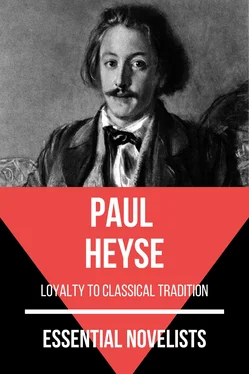Title Page
Author
The Children of the World
The Romance of the Canoness Конец ознакомительного фрагмента. Текст предоставлен ООО «ЛитРес». Прочитайте эту книгу целиком, купив полную легальную версию на ЛитРес. Безопасно оплатить книгу можно банковской картой Visa, MasterCard, Maestro, со счета мобильного телефона, с платежного терминала, в салоне МТС или Связной, через PayPal, WebMoney, Яндекс.Деньги, QIWI Кошелек, бонусными картами или другим удобным Вам способом.
About the Publisher Конец ознакомительного фрагмента. Текст предоставлен ООО «ЛитРес». Прочитайте эту книгу целиком, купив полную легальную версию на ЛитРес. Безопасно оплатить книгу можно банковской картой Visa, MasterCard, Maestro, со счета мобильного телефона, с платежного терминала, в салоне МТС или Связной, через PayPal, WebMoney, Яндекс.Деньги, QIWI Кошелек, бонусными картами или другим удобным Вам способом.

PAUL JOHANN LUDWIG von Heyse, (born March 15, 1830, Berlin, Prussia [Germany]—died April 2, 1914, Munich, Ger.), German writer and prominent member of the traditionalist Munich school who received the Nobel Prize for Literature in 1910.
Heyse studied classical and Romance languages and traveled for a year in Italy, supported by a research grant. After completing his studies he became an independent scholar and was called to Munich by Maximilian II of Bavaria. There, with the poet Emanuel Geibel, he became the head of the Munich circle of writers, who sought to preserve traditional artistic values from the encroachments of political radicalism, materialism, and realism. He became a master of the carefully wrought short story, a chief example of which is L’Arrabbiata (1855). He also published novels (Kinder der Welt, 1873; Children of the World) and many unsuccessful plays.
Among his best works are his translations of the works of Giacomo Leopardi and other Italian poets. His poems provided the lyrics for many lieder by the composer Hugo Wolf. Heyse, who was given to idealization and who refused to portray the dark side of life, became an embittered opponent of the growing school of Naturalism, and his popularity had greatly decreased by the time he received the Nobel Prize.
The Children of the World
"The children of this world are in their generation wiser than the
children of light."
––––––––
––––––––
––––––––

A FEW YEARS AGO, IN the Dorotheen-strasse, in the midst of the Latin Quarter of Berlin, whose quiet, student-like appearance threatens to become effaced by the growing elegance of the capital, a small, narrow, unpretending two-story house, stood humbly, as if intimidated, between its broad-shouldered neighbors, though every year it received a washing of a delicate pink hue, and recently had even had a new lightning-rod affixed to its ancient gable roof. The owner, an honest master shoemaker, had in the course of time accumulated money enough to have comfortably established himself in a new and far more elegant dwelling, but he had experienced beneath this sharply sloping roof, all the blessings of his life and though a man by no means given to sentimental weaknesses, he would have thought it base ingratitude to turn his back, without good reason, upon the old witnesses and protectors of his happiness. He had, at one time or another, laid his head in almost every corner, from the little attic chamber, where, as a poor dunce of an apprentice, he had, many a night, been unable to close his eyes on account of the pattering raindrops, to the best room on the first story, where stood his nuptial couch, when, after a long and faithful apprenticeship, he brought home, as head journeyman, the daughter of his dead master. But he was far too economical to permit himself to occupy these aristocratic quarters longer than six months, preferring to live in the second story, unassuming as it was—the little house having a front of but three windows—and there, two children had grown up about him. These first-floor apartments were rented to a childless old couple, to whom the owner would not have given notice to quit on any account; for in the white-haired old man he honored a once famous tenor, whom in his youth, he had heard and admired; while the little withered old woman, his wife, had, in her time, been a no less celebrated actress. They had already been pensioned twelve years, and, without song or noise of any kind, spent their quiet days in their tiny rooms, adorned with faded laurel-wreaths and pictures of their famous colleagues. These celebrities, according to the ideas of the proprietor, gave to his little house a certain artistic reputation, and if there were customers in the shop at noon when the old couple returned from their walk, he never failed to direct attention to them and with boastful assurance to revive the fame of the two forgotten and very shrivelled great personages.
On the ground floor was the shop, over which a black sign bore the inscription in gilt letters: "Boot & Shoe Making Done by Gottfried Feyertag." The shoemaker had ordered the large brown boot and red slipper, which had originally been painted on the right and left side, to be effaced, because it annoyed him to see them, when they no longer represented the fashion. He kept up with the times in his trade, and could not possibly alter his sign at every change of style. The shop, he generally left to the management of his wife he himself spending most of the day in the workroom, where he kept a sharp eye on his four or five journeymen. A narrow entry led past the shop into a small, well-kept courtyard, in whose centre stood a tall acacia-tree, three quarters of which had died for want of air and sunlight, so that only its topmost branches were still adorned with a few pale green, consumptive-looking leaves, which every autumn turned yellow some weeks before any other foliage. Here, in one corner, beside the pump, an arbor had been erected by the head journeyman, for the daughter of the house, when a school-girl; it consisted of a few small poles roughly nailed together, and now overgrown with bean-vines, which bloomed most dutifully every summer, but in the best years never produced more than a handful of stunted pods. A little bed along the so-called sunny side of the house contained all sorts of plants that seek the shade, and thrive luxuriantly around cisterns and cellars; and in midsummer, when the sun actually sent a few rays into the courtyard at noonday, the little spot really looked quite gay, especially if the fair-haired Reginchen, now a young girl of seventeen, were seated there reading—if it chanced to be a Sunday—some tale of robbers from a book obtained at a circulating library.
Читать дальше














